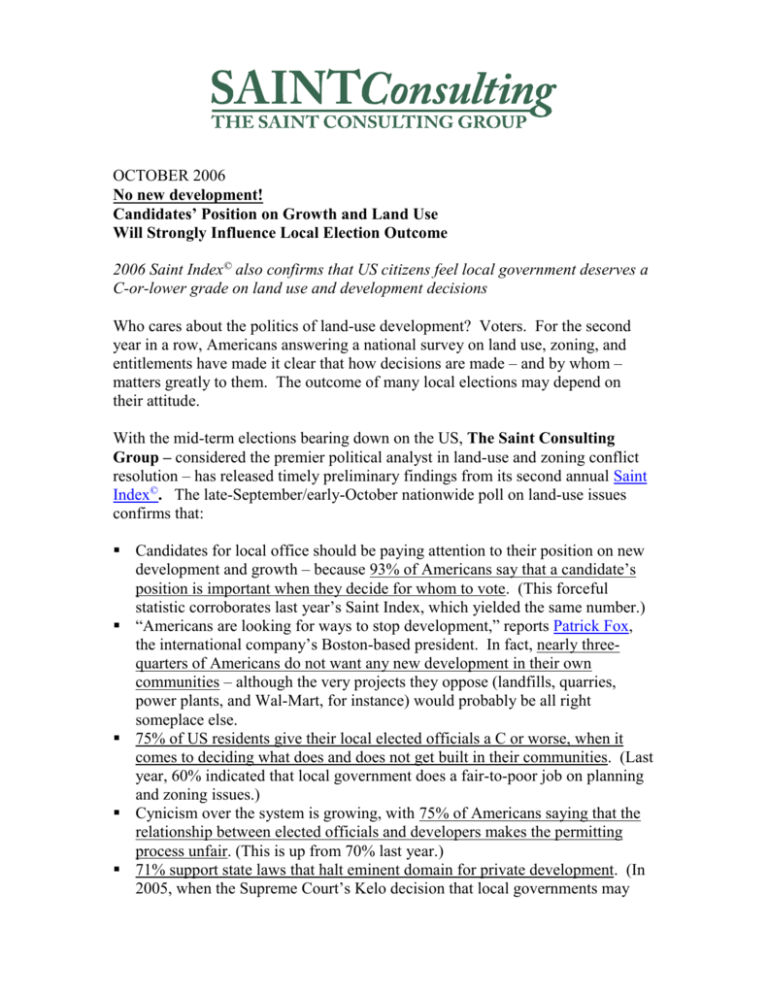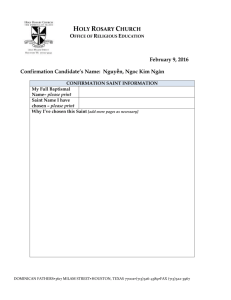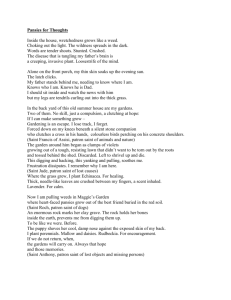as Word document - The Saint Consulting Group
advertisement

OCTOBER 2006 No new development! Candidates’ Position on Growth and Land Use Will Strongly Influence Local Election Outcome 2006 Saint Index© also confirms that US citizens feel local government deserves a C-or-lower grade on land use and development decisions Who cares about the politics of land-use development? Voters. For the second year in a row, Americans answering a national survey on land use, zoning, and entitlements have made it clear that how decisions are made – and by whom – matters greatly to them. The outcome of many local elections may depend on their attitude. With the mid-term elections bearing down on the US, The Saint Consulting Group – considered the premier political analyst in land-use and zoning conflict resolution – has released timely preliminary findings from its second annual Saint Index©. The late-September/early-October nationwide poll on land-use issues confirms that: Candidates for local office should be paying attention to their position on new development and growth – because 93% of Americans say that a candidate’s position is important when they decide for whom to vote. (This forceful statistic corroborates last year’s Saint Index, which yielded the same number.) “Americans are looking for ways to stop development,” reports Patrick Fox, the international company’s Boston-based president. In fact, nearly threequarters of Americans do not want any new development in their own communities – although the very projects they oppose (landfills, quarries, power plants, and Wal-Mart, for instance) would probably be all right someplace else. 75% of US residents give their local elected officials a C or worse, when it comes to deciding what does and does not get built in their communities. (Last year, 60% indicated that local government does a fair-to-poor job on planning and zoning issues.) Cynicism over the system is growing, with 75% of Americans saying that the relationship between elected officials and developers makes the permitting process unfair. (This is up from 70% last year.) 71% support state laws that halt eminent domain for private development. (In 2005, when the Supreme Court’s Kelo decision that local governments may seize private property for economic development purposes was passed down, the first Saint Index learned that 81% of Americans opposed allowing the taking of private property by eminent domain.) The Saint Consulting Group specializes in land use politics. Saint Consulting headquarters are near Boston; there are ten other American offices, one in London, and one in Toronto about to open. Survey methodology This is the second Saint Index that Saint Consulting has done in the US; the first was a year ago. Another survey occurred last spring in the UK [comparative results available]. MC Squared Consulting conducted this research for the current Index, interviewing by telephone 1,000 respondents randomly selected across the States. Vigorous opposition to development and eminent domain decisions will trip local elections Pat Fox comments that “The survey once again shows that twice as many Americans have actively opposed development as have supported it.” He explains further that American homeowners – nowadays far more politically sophisticated in defense of their neighborhoods – are holding elected officials accountable. Their frustration and anger over development issues will unquestionably have an impact on local elections.” As for the eminent domain issue, Fox asks, “How could communities that basically distrust their officials accept that they could seize and demolish private homes in favor of economic development?” Why the opposition? Taking the local pulse According to the new Saint Index, the primary reasons for opposition are protection of property values (36%) and preservation of community character (29%). The environment received an 11% response. Fox comments that “Americans are defending their communities from sprawl and over-development – but their primary motivation is the defense of their real estate values. Name a community that welcomes development nowadays.” Indeed, the 2006 Saint Index indicates that there is 70% support for using tax dollars to keep land undeveloped – and 38% feel that “strongly.” “Developers expect a fight to build just about anything, anywhere – not just quarries, landfills, power plants, and Wal-Mart, all of which the survey indicates are even more opposed than last year,” Fox reports. Today’s heightened opposition includes intense constituent pressure on local officials to reject new project proposals. Angry constituents pack public hearings, generate phone calls to city councilors and town board members, and make it clear that they will vote for candidates who oppose new development. “Elected officials are very unlikely to vote against their wishes,” Fox states. Background on Saint Consulting and The Saint Index The Saint Consulting Group began operations in 1983 and today has 11 offices around the US, one in the UK, and Toronto in the offing. With a staff of 65 and a success rate of over 90%, Saint Consulting advises on the politics of land-use planning issues. Among the industries that use its services are aggregates, casinos, grocery and retail, landfills, mixed-use developments, housing, and utilities. The Saint Consulting Group’s plan is to become a global leader in landuse political consultancy as available land dwindles, and as land-use debates grow increasingly contentious. The first Saint Index research was performed in autumn 2005; the UK index was undertaken in spring 2006. ###









